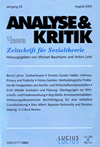Symposium on R. Axelrod's

2000 (22) Issue 1
Table of Contents
Title: Generalised Reciprocity and Reputation in the Theory of Cooperation
Author: Peter Abell / Diane Reyniers
Page: 3-18
Abstract: We study the Iterated Bilateral Reciprocity game in which the need for help arises randomly. Players are heterogeneous with respect to 'neediness' i.e. probability of needing help. We find bounds on the amount of heterogeneity which can be tolerated for cooperation (all players help when asked to help) to be sustainable in a collectivity. We introduce the notion of Generalised Reciprocity. Individuals make a costly first move to benefit another under the reasonable expectation that either the other or somebody else will reciprocate. We hope that these tentative attempts at extending Axelrod's seminal work on cooperation will inspire future efforts in the field of organisational culture and social theory more generally.
Title: Cooperation via Hostages
Author: Werner Raub / Jeroen Weesie
Page: 19-43
Abstract: Conditional cooperation of selfish and rational actors is feasible in repeated encounters. We stress an important alternative for conditional cooperation: credible commitments that can be incurred via voluntary hostage posting (in the sense of pledging a bond). Hostages may facilitate cooperation in different ways. First, they reduce incentives to behave uncooperatively. Second, by offering some compensation for losses, hostages reduce the costs of suffering from uncooperative behavior of the partner. Finally, hostages may serve as signals about characteristics of the partner that are related to his opportunities and incentives to behave uncooperatively. We show that signalling hostages may have lasting effects in durable relations.
Title: Cooperation via Social Networks
Author: Vincent Buskens / Jeroen Weesie
Page: 44-74
Abstract: Sufficiently frequent interaction between partners has been identified by, a.o., Axelrod as a more-or-less sufficient condition for stable cooperation. The underlying argument is that rational cooperation is ensured if short-term benefits from opportunistic behavior are offset by the long-term costs of sanctions imposed on the culprit. In this paper, we develop a model for 'embedded trust' in which a trustee interacts with a number of trustors who may communicate via a social network with each other about the behavior of the trustor. The analysis reconfirms the standard predictions about how the level of trust depends on the payoffs and shadow of the future. We provide new predictions both on between-network effects ('which network is more favorable for cooperation?') and on within-network effects ('in what network position can you trust more?').
Title: Rational and Adaptive Playing
Author: Rainer Hegselmann / Andreas Flache
Page: 75-97
Abstract: n this paper we compare two micro foundations for modelling human behaviour and decision making. We focus on perfect strategic rationality on the one hand and a simple reinforcement mechanism on the other hand. Iterated prisoner's dilemmas serve as the play ground for the comparison. The main lesson of our analysis is that in the space of all possible 2x2 PDs different micro foundations do matter. This suggests that researchers can not safely rely on the assumption that implementing simple models of decision making will yield the same results that may be obtained when more sophisticated decision rules are built into the agents.
Title: In Defense of Moderate Envy
Author: Bernd Lahno
Page: 98-113
Abstract: In contrast to Axelrod's advice 'don't be envious' it is argued that the emotion of envy may enhance cooperation. TIT FOR TAT does exhibit a certain degree of envy. But, it does so in inconsistent ways. Two variants of TIT FOR TAT are introduced and their strategic properties are analyzed. Both generate the very same actual play as TIT FOR TAT in a computer tournament without noise. However, if noise is introduced they display some greater degree of stability. This is due to the fact that they form, in a prisoner's dilemma supergame with suitable parameters, an equilibrium with themselves that is subgame perfect or (in case of the first strategy) close to subgame perfect. It is additionally argued that these strategies are exceptionally clear and comprehensible to others in that they conform to well known real live behavior patterns.
Title: Exit, Anonymity and the Chances of Egoistical Cooperation
Author: The EdK-Group
Page: 114-129
Abstract: This paper presents the results of computer simulations with a community of actors playing a large number of voluntarily iterated two-person-PD. The simulations are designed to enable uncooperative actors to exploit partners, leave them and find a new partner who knows nothing about their previous behavioral history. Hit-and-run exploitation should thrive under these conditions. However, as Schuessler (1989; 1990) has shown, the setting is highly unfavorable to uncooperative players. The present study extends this result to a wider set of strategies which can alternatively stay with defectors (and try to improve them) or leave them quickly. In addition, a class of seemingly clever strategies is introduced which try to exploit the expected dynamics of looking for a partner. Still, a high amount of egoistical cooperation can persist in the present scenario.
Title: On Six Advances in Cooperation Theory
Author: Robert Axelrod
Page: 130-151
Abstract: The symposium included in this issue of ANALYSE & KRITIK extends the basis of Cooperation Theory as set forth in Axelrod's 'Evolution of Cooperation' (1984). This essay begins with an overview of Cooperation Theory in terms of the questions it asks, its relationship to game theory and rationality, and the principal methodologies used, namely deduction and simulation. This essay then addresses the issues raised in the symposium, including the consequences of extending the original paradigm of the two person iterated Prisoner's Dilemma to take into account such factors as nonsimultaneous play, the ability to offer hostages for performance, social networks of interaction, information sharing that can support reputations, learning behavior, envy, misunderstanding, and an option to exit. The essay places the contributions of this symposium in the context of previous research on these and related issues.